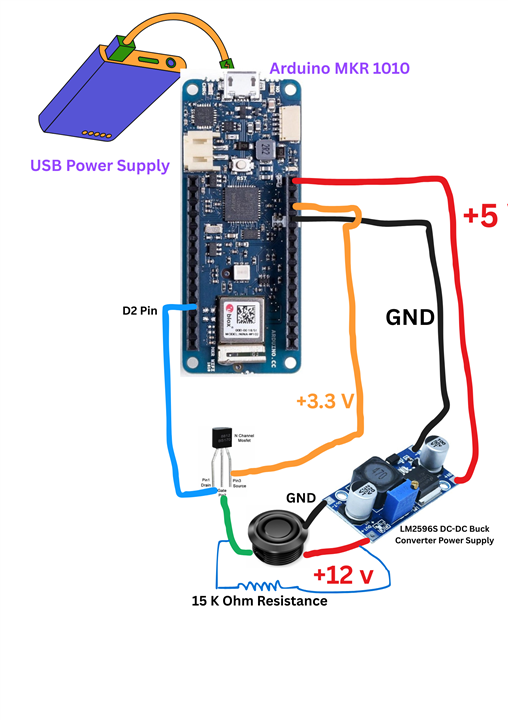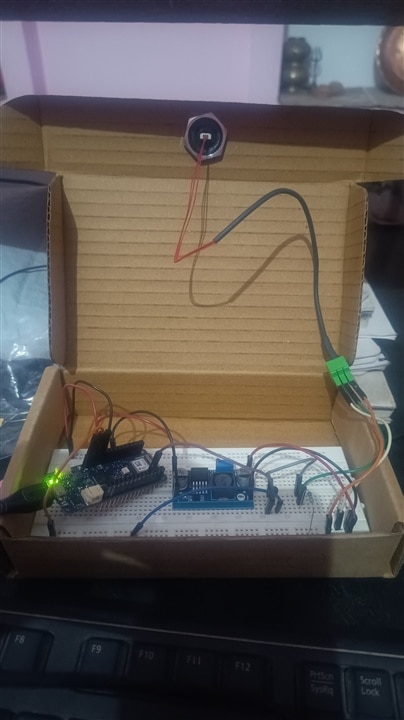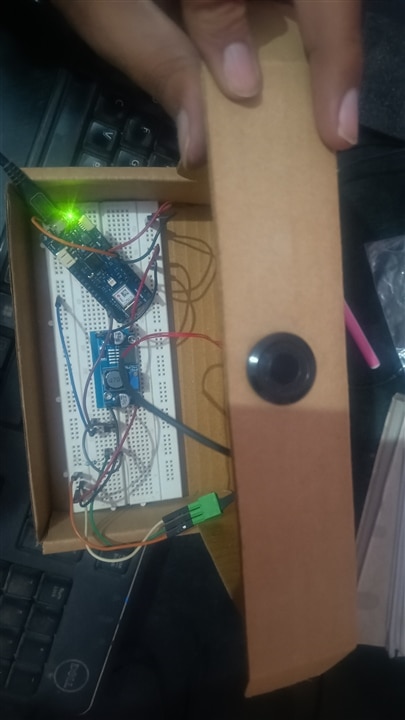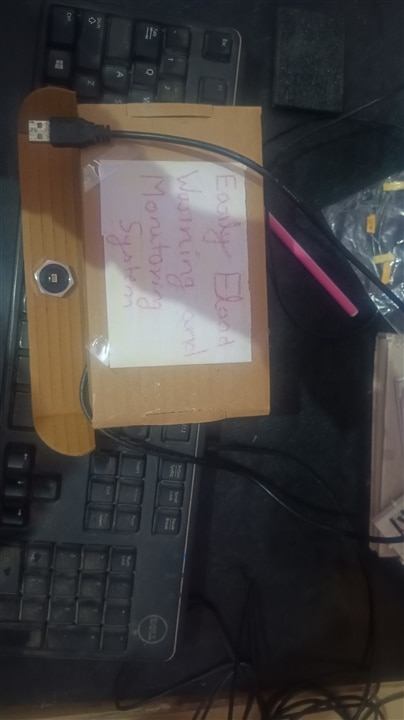So the fun part begins — wires, boards, and the faint smell of solder.
This is where the project goes from “cool idea” to “actual blinking lights.”
Here in this blog we will discuss the wiring of all components and the Code inside the Arduino Board.
Circuit Arrangement:

Required Hardware:
- TDK USSM Distance measurement sendor — the stars of the show.They send ultrasonic pings and measure how long it takes for echoes to come back.
- Arduino MKR WiFi 1010 — the brain that reads data, processes it, and sends it to the online google sheet for collection anf furture analysis as well as initiate warning email when danger mark is near.
- BS170 MOSFET , 15 k Ohm Resistance , used for logic level converter to safely operate our arduino
- LM2596S DC-DC Buck Converter Power Supply to poweup the sensor with 12 v
- A bunch of colorful jumper wires — because what’s a DIY project without a rainbow of cables?



Open Arduino IDE and Upload following code into it
// TDK-MKR-Logger - MKR WiFi 1010 sketch (simulation mode) - API key + server-config reflect
// Paste into Arduino IDE and upload to MKR WiFi 1010
// Requires: WiFiNINA, ArduinoJson (v6.x)
// ------------------------ user config (replace placeholders) ------------------------
// set this to the API_SECRET / key you put in ConfigDetails (column Value for key API_SECRET)
const char* API_KEY = "jlkajlkj"; // <--- replace to match your sheet's API_SECRET
const char* SENSOR_NAME = "MKR_UltraSim_01"; // change if needed
const unsigned long POST_TIMEOUT_MS = 30UL * 1000UL; // wait up to 30s for server response
// ------------------------------------------------------------------------------------
#include <WiFiNINA.h>
#include <ArduinoJson.h>
#include "arduino_secrets.h" // must contain SECRET_SSID and SECRET_PASS
#include <TDK_USSM.h>
//-- Instanciate Single Sensor
TDK_USSM TdkUssm(2); //Initialize Sensor Pins (IoPin)
unsigned long POST_INTERVAL_MS = 10000; // default if server doesn't override
float THRESHOLD_VALUE = 15.0; // default if server doesn't override
unsigned long lastPost = 0;
void setup() {
Serial.begin(115200);
while (!Serial && millis() < 4000) ; // wait for Serial (short)
Serial.println();
Serial.println("TDK-MKR-Logger (with API key) starting...");
randomSeed(analogRead(A0)); // seed random for simulation
connectWiFi();
// Optional: if you set GAS_CONFIG_URL and want to fetch config on boot, uncomment:
// if (strlen(GAS_CONFIG_URL) > 0) tryFetchConfig();
lastPost = millis() - 1000;
}
void loop() {
unsigned long now = millis();
// Only try posting on interval
if (now - lastPost >= POST_INTERVAL_MS) {
lastPost = now;
int value = readDistanceSim(); // you changed to int
bool alertNeeded = (value < THRESHOLD_VALUE);
// Build JSON payload
StaticJsonDocument<256> doc;
doc["sensor_name"] = SENSOR_NAME;
doc["value"] = value;
doc["alert_requested"] = alertNeeded;
doc["device"] = "MKR1010";
doc["uptime_ms"] = now;
doc["api_key"] = API_KEY;
String payload;
serializeJson(doc, payload);
Serial.print("Posting payload: ");
Serial.println(payload);
String serverResp;
const int MAX_POST_ATTEMPTS = 3;
bool postOk = false;
int attempt = 0;
unsigned long backoff = 500; // ms - initial backoff
while (attempt < MAX_POST_ATTEMPTS && !postOk) {
attempt++;
Serial.print("POST attempt ");
Serial.println(attempt);
if (httpPostJson(FLOOD_POST_URL, payload, serverResp)) {
postOk = true;
Serial.println("POST succeeded.");
Serial.print("Server raw response: ");
Serial.println(serverResp);
// parse & apply server config (same as before)...
StaticJsonDocument<512> respDoc;
DeserializationError err = deserializeJson(respDoc, serverResp);
if (!err) {
if (respDoc.containsKey("config")) {
JsonObject cfg = respDoc["config"].as<JsonObject>();
if (cfg.containsKey("THRESHOLD_VALUE")) {
float newTh = cfg["THRESHOLD_VALUE"].as<float>();
Serial.print("Server requested THRESHOLD_VALUE = ");
Serial.println(newTh);
THRESHOLD_VALUE = newTh;
}
if (cfg.containsKey("POST_INTERVAL_MS")) {
unsigned long newInterval = cfg["POST_INTERVAL_MS"].as<unsigned long>();
Serial.print("Server requested POST_INTERVAL_MS = ");
Serial.println(newInterval);
POST_INTERVAL_MS = newInterval;
}
}
if (respDoc.containsKey("alert")) {
const char* alertText = respDoc["alert"];
Serial.print("Server alert: ");
Serial.println(alertText);
}
} else {
Serial.print("Failed to parse server JSON: ");
Serial.println(err.c_str());
}
break;
} else {
Serial.println("POST failed on attempt.");
// small delay with backoff before retrying
delay(backoff);
backoff = min(backoff * 2, 5000UL); // cap at 5s
}
} // end attempts
if (!postOk) {
Serial.println("All POST attempts failed.");
// Only attempt WiFi reconnect if link is actually not connected
if (WiFi.status() != WL_CONNECTED) {
Serial.print("WiFi status != CONNECTED (");
Serial.print(WiFi.status());
Serial.println(") - attempting reconnect.");
connectWiFi();
} else {
Serial.println("WiFi appears connected; not reconnecting. Will try again on next interval.");
// Optionally: you could force a reconnect if you see many consecutive POST failures
}
}
}
// If WiFi truly drops outside POST, try reconnecting (small check once every 10s)
static unsigned long lastWifiCheck = 0;
if (millis() - lastWifiCheck > 10000) {
lastWifiCheck = millis();
if (WiFi.status() != WL_CONNECTED) {
Serial.print("WiFi status check: not connected (");
Serial.print(WiFi.status());
Serial.println("). Reconnecting.");
connectWiFi();
}
}
delay(50);
}
void printConfig() {
Serial.println(F("\n--- Current Configuration ---"));
Serial.print(F("THRESHOLD_VALUE: "));
Serial.println(THRESHOLD_VALUE);
Serial.print(F("POST_INTERVAL_MS: "));
Serial.println(POST_INTERVAL_MS);
Serial.println(F("------------------------------\n"));
}
/* -------------------- helpers -------------------- */
int readDistanceSim() {
TdkUssm.GetDistanceCm(); // Prints Distance in cm.
}
void connectWiFi() {
Serial.print("Connecting to WiFi SSID: ");
Serial.println(SECRET_SSID);
WiFi.end();
delay(200);
int status = WiFi.begin(SECRET_SSID, SECRET_PASS);
unsigned long start = millis();
while (WiFi.status() != WL_CONNECTED && (millis() - start) < POST_TIMEOUT_MS) {
delay(500);
Serial.print(".");
}
if (WiFi.status() == WL_CONNECTED) {
Serial.println();
Serial.print("WiFi connected. IP: ");
Serial.println(WiFi.localIP());
} else {
Serial.println();
Serial.print("WiFi connect failed, status=");
Serial.println(WiFi.status());
}
}
// Simple HTTPS POST with JSON payload; returns server response body
bool httpPostJson(const String &url, const String &jsonPayload, String &responseBody) {
responseBody = "";
if (url.length() == 0) {
Serial.println("GAS_POST_URL not set!");
return false;
}
String host = hostFromUrl(url);
String path = pathFromUrl(url);
if (host.length() == 0 || path.length() == 0) {
Serial.println("Invalid GAS_POST_URL.");
return false;
}
WiFiSSLClient client;
Serial.print("HTTPS POST to host: ");
Serial.print(host);
Serial.print(" path: ");
Serial.println(path);
if (!client.connect(host.c_str(), 443)) {
Serial.println("Connection failed (POST).");
return false;
}
// Build request
client.print(String("POST ") + path + " HTTP/1.1\r\n");
client.print(String("Host: ") + host + "\r\n");
client.print("Connection: close\r\n");
client.print("Content-Type: application/json\r\n");
client.print(String("Content-Length: ") + jsonPayload.length() + "\r\n");
client.print("User-Agent: MKR1010\r\n");
client.print("\r\n");
client.print(jsonPayload);
unsigned long timeout = millis();
while (client.connected() && !client.available()) {
if (millis() - timeout > 8000) {
Serial.println("Timeout waiting for POST response.");
client.stop();
return false;
}
}
// read status line
String statusLine = client.readStringUntil('\n');
statusLine.trim();
Serial.print("Status: ");
Serial.println(statusLine);
// skip headers
while (client.available()) {
String line = client.readStringUntil('\n');
line.trim();
if (line.length() == 0) break;
}
// read body
String body = "";
unsigned long start = millis();
while (client.available()) {
char c = client.read();
body += c;
if (millis() - start > 8000) break;
}
client.stop();
responseBody = body;
return true;
}
// URL helpers
String hostFromUrl(const String &url) {
int idx = url.indexOf("://");
int start = (idx >= 0) ? idx + 3 : 0;
int slash = url.indexOf('/', start);
if (slash < 0) return url.substring(start);
return url.substring(start, slash);
}
String pathFromUrl(const String &url) {
int idx = url.indexOf("://");
int start = (idx >= 0) ? idx + 3 : 0;
int slash = url.indexOf('/', start);
if (slash < 0) return "/";
return url.substring(slash);
}
// arduino_secrets.h
// Put this in the same folder as your sketch or in your Arduino sketchbook/libraries folder.
// Replace the values between the quotes exactly (case-sensitive). No trailing spaces.
#ifndef ARDUINO_SECRETS_H
#define ARDUINO_SECRETS_H
#define SECRET_SSID "WIFIname" // <-- replace with your Wi-Fi SSID (2.4 GHz)
#define SECRET_PASS "wifipass" // <-- replace with your Wi-Fi password
#define HTTPS_PORT_NUMBER 443
#define FLOOD_POST_URL "https://script.google.com/macros/s/AKfycbw27cP9jphgyeJNA7Mr2523E2NE8FiNO1ZGUrQqqFY99Hr-roe357eSuJDAVEvfmZKCzw/exec"
// OPTIONAL: endpoint that returns JSON config { "THRESHOLD_VALUE": 15, "POST_INTERVAL_MS": 10000 }
// If you don't have this, set GAS_CONFIG_URL to "" and sketch will use defaults below.
#define FLOOD_CONFIG_URL "https://script.google.com/macros/s/REPLACE_WITH_YOUR_CONFIG_URL/exec"
#endif
In Next Blog we will see the testing and results
